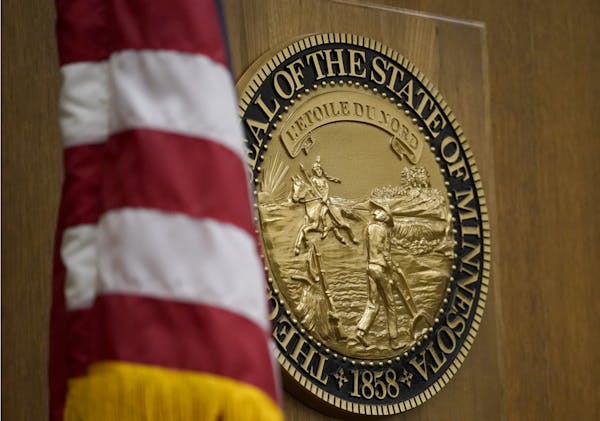As the spring melt invites increasing foot traffic to 38th Street and Chicago Avenue, Madi Ramirez-Tentinger is trying to find and paint over some of the anti-police graffiti sprinkled among the protest art. The statements have long been part of the intersection now known as George Floyd Square, but as the trial over Floyd's death approaches, Ramirez-Tentinger doesn't want to give anyone an excuse to demonize the area.
"We're preparing for white supremacists, we're preparing for provocateurs, we're preparing for naysayers, we're preparing for police," said Ramirez-Tentinger, a stand-up comedian who's always joking to dispel tension in the square.
Many longtime caretakers of the square are trying to tamp their own anxieties as they strive to present a unified front during what they consider a watershed moment with the world watching.
The most committed protesters have shown up consistently for nine months to watch the barricades, clean up around the square and chop wood for twice-daily fire pit meetings.
They put their lives on pause to sit in guard shacks through a polar vortex, defending the zone against vandals and city officials under pressure to reopen the street.
"I hope for justice. I hope for accountability," Ramirez-Tentinger said. "Yeah, there's part of me that thinks it's not gonna happen. So that's a contingency plan in itself. We have to prepare for if it doesn't. We've got to prepare for what that means for all of us."
Plans are in the works to receive a mass of visitors as ex-police officer Derek Chauvin stands trial for murder in Floyd's death. Protesters have discussed providing refreshments and arranging flowers to lay on Floyd's memorial.
Groups have scheduled vigils and protests at the square. They expect the city to drop off more portable toilets and hand-washing stations.
The occupiers don't plan to be gatekeepers so much as ushers, setting a solemn tone and guiding visitors through what they hope people appreciate as a sacred place, said Marcia Howard, another fixture of the intersection.
"We the people that occupied the square have spent nine months dealing with an almost communal, cathartic way of anticipating injustice," she said. "We're here with a cautious hope."
Part of the preparation is also anticipating a fight.
Kim Wooster of 612 MASH, a group that provides basic first aid at protests, issued a call for volunteers across the country to convene at the square. Their plan is to erect a medical tent at Calvary Lutheran Church down the street.
For her, the upcoming trial invokes painful memories of last summer.
While rioters set businesses on fire, causing millions of dollars in damage, numerous videos also showed police macing peaceful crowds as they drove through downtown, peppering residents on their porches with less lethal projectiles, detaining credentialed journalists, and shooting rubber bullets at protest medics wearing scrubs with red crosses. Wooster, like Howard, has served in the military.
"If that had been anywhere near a conflict zone, that would have been a war crime. It's downright heinous," she said. "I want justice for this community. Show them you can actually make justice happen in what small modicum you're offering. And if it's not going to happen, don't be surprised when people are angry."
Hulk Smash, standing 6 feet 5 inches tall, has volunteered to provide security.
"You all come in here, you're an active protester and a part of my family and I've got to protect you. I will take a bullet for anybody in this square," said Smash, who has come to think of occupying the zone as an exercise in building a better world.
"If [Chauvin] walks free, we did this for nothing," he said. "I'm going to do this with my last breath. I'm not going to stop until I get the things I need that will lead to change."
At the square's south gate, volunteers guard a barricade that glides open for residents, delivery drivers and churchgoers who show up Sundays at Worldwide Outreach for Christ.
Phi Khalar, the square's shy, self-described "grunt," can be found there almost every day after work. Over the past nine months, Khalar has summoned courage to greet visitors from coast to coast, and as far away as Europe and Central America.
Khalar plans to show up every day of the trial as well. "My hopes are that people are able to stay righteous and patient, and not make any moves that put all the work that we've done here in jeopardy," Khalar said.
Frank Yellow has a bad feeling about the verdict to come.
"There's a lot of anger, confusion, sadness. … I feel someone's going to do something stupid," he said. "People have to decide here pretty soon, what side they want to be on."
His father Francis J. Yellow explained, "We're not speaking for everybody here, but most people of color don't have any faith in the system. We're kind of expecting the worst. The rule of law applies differently to the police, who are a protected class by legislation that allows them to murder people in public, or torture. Even with damning evidence on video, it seems like it's not as cut and dry as the people would think."
Susan Du • 612-673-4028





